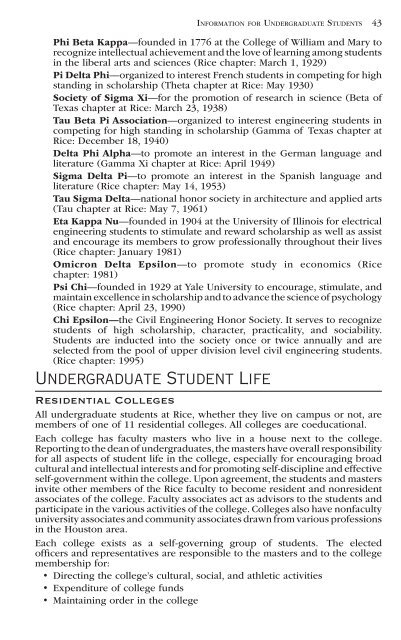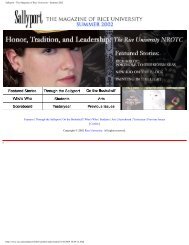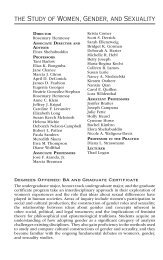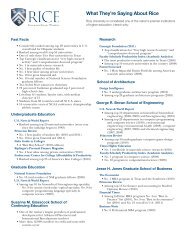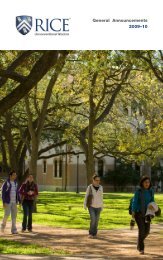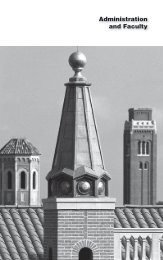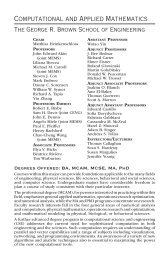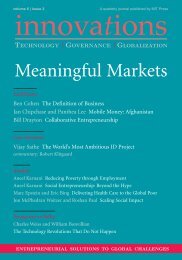Information for Undergraduate Students - Rice University
Information for Undergraduate Students - Rice University
Information for Undergraduate Students - Rice University
You also want an ePaper? Increase the reach of your titles
YUMPU automatically turns print PDFs into web optimized ePapers that Google loves.
In f o r m a t i o n f o r Un d e r g r a d u a t e St u d e n t s 43<br />
Phi Beta Kappa—founded in 1776 at the College of William and Mary to<br />
recognize intellectual achievement and the love of learning among students<br />
in the liberal arts and sciences (<strong>Rice</strong> chapter: March 1, 1929)<br />
Pi Delta Phi—organized to interest French students in competing <strong>for</strong> high<br />
standing in scholarship (Theta chapter at <strong>Rice</strong>: May 1930)<br />
Society of Sigma Xi—<strong>for</strong> the promotion of research in science (Beta of<br />
Texas chapter at <strong>Rice</strong>: March 23, 1938)<br />
Tau Beta Pi Association—organized to interest engineering students in<br />
competing <strong>for</strong> high standing in scholarship (Gamma of Texas chapter at<br />
<strong>Rice</strong>: December 18, 1940)<br />
Delta Phi Alpha—to promote an interest in the German language and<br />
literature (Gamma Xi chapter at <strong>Rice</strong>: April 1949)<br />
Sigma Delta Pi—to promote an interest in the Spanish language and<br />
literature (<strong>Rice</strong> chapter: May 14, 1953)<br />
Tau Sigma Delta—national honor society in architecture and applied arts<br />
(Tau chapter at <strong>Rice</strong>: May 7, 1961)<br />
Eta Kappa Nu—founded in 1904 at the <strong>University</strong> of Illinois <strong>for</strong> electrical<br />
engineering students to stimulate and reward scholarship as well as assist<br />
and encourage its members to grow professionally throughout their lives<br />
(<strong>Rice</strong> chapter: January 1981)<br />
Omicron Delta Epsilon—to promote study in economics (<strong>Rice</strong><br />
chapter: 1981)<br />
Psi Chi—founded in 1929 at Yale <strong>University</strong> to encourage, stimulate, and<br />
maintain excellence in scholarship and to advance the science of psychology<br />
(<strong>Rice</strong> chapter: April 23, 1990)<br />
Chi Epsilon—the Civil Engineering Honor Society. It serves to recognize<br />
students of high scholarship, character, practicality, and sociability.<br />
<strong>Students</strong> are inducted into the society once or twice annually and are<br />
selected from the pool of upper division level civil engineering students.<br />
(<strong>Rice</strong> chapter: 1995)<br />
<strong>Undergraduate</strong> Student Life<br />
Residential Colleges<br />
All undergraduate students at <strong>Rice</strong>, whether they live on campus or not, are<br />
members of one of 11 residential colleges. All colleges are coeducational.<br />
Each college has faculty masters who live in a house next to the college.<br />
Reporting to the dean of undergraduates, the masters have overall responsibility<br />
<strong>for</strong> all aspects of student life in the college, especially <strong>for</strong> encouraging broad<br />
cultural and intellectual interests and <strong>for</strong> promoting self-discipline and effective<br />
self-government within the college. Upon agreement, the students and masters<br />
invite other members of the <strong>Rice</strong> faculty to become resident and nonresident<br />
associates of the college. Faculty associates act as advisors to the students and<br />
participate in the various activities of the college. Colleges also have nonfaculty<br />
university associates and community associates drawn from various professions<br />
in the Houston area.<br />
Each college exists as a self-governing group of students. The elected<br />
officers and representatives are responsible to the masters and to the college<br />
membership <strong>for</strong>:<br />
• Directing the college’s cultural, social, and athletic activities<br />
• Expenditure of college funds<br />
• Maintaining order in the college


